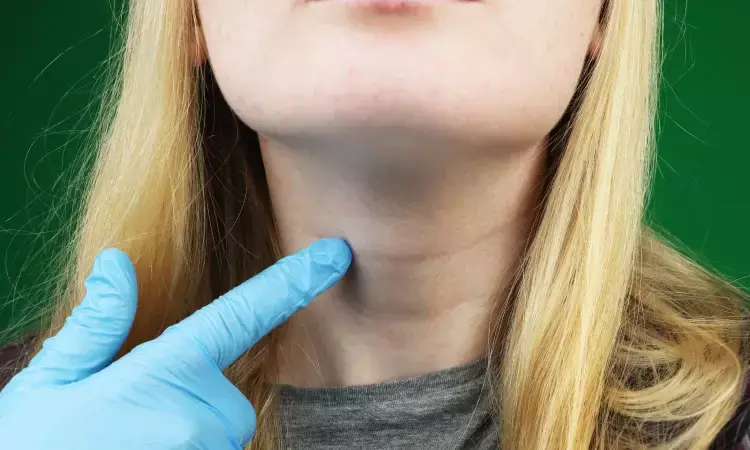- Home
- Medical news & Guidelines
- Anesthesiology
- Cardiology and CTVS
- Critical Care
- Dentistry
- Dermatology
- Diabetes and Endocrinology
- ENT
- Gastroenterology
- Medicine
- Nephrology
- Neurology
- Obstretics-Gynaecology
- Oncology
- Ophthalmology
- Orthopaedics
- Pediatrics-Neonatology
- Psychiatry
- Pulmonology
- Radiology
- Surgery
- Urology
- Laboratory Medicine
- Diet
- Nursing
- Paramedical
- Physiotherapy
- Health news
- Fact Check
- Bone Health Fact Check
- Brain Health Fact Check
- Cancer Related Fact Check
- Child Care Fact Check
- Dental and oral health fact check
- Diabetes and metabolic health fact check
- Diet and Nutrition Fact Check
- Eye and ENT Care Fact Check
- Fitness fact check
- Gut health fact check
- Heart health fact check
- Kidney health fact check
- Medical education fact check
- Men's health fact check
- Respiratory fact check
- Skin and hair care fact check
- Vaccine and Immunization fact check
- Women's health fact check
- AYUSH
- State News
- Andaman and Nicobar Islands
- Andhra Pradesh
- Arunachal Pradesh
- Assam
- Bihar
- Chandigarh
- Chattisgarh
- Dadra and Nagar Haveli
- Daman and Diu
- Delhi
- Goa
- Gujarat
- Haryana
- Himachal Pradesh
- Jammu & Kashmir
- Jharkhand
- Karnataka
- Kerala
- Ladakh
- Lakshadweep
- Madhya Pradesh
- Maharashtra
- Manipur
- Meghalaya
- Mizoram
- Nagaland
- Odisha
- Puducherry
- Punjab
- Rajasthan
- Sikkim
- Tamil Nadu
- Telangana
- Tripura
- Uttar Pradesh
- Uttrakhand
- West Bengal
- Medical Education
- Industry
Repeated exposure to specific phenol chemicals may adversely affect thyroid function in women

USA: A recent study published in Toxics Journal provides additional insights into how exposure to environmental chemicals and lifestyle choices may affect reproductive health.
The study revealed multiple associations between phenol biomarkers and altered thyroid hormone measurements among women seeking fertility care.
“Many women nowadays experience thyroid problems. Therefore, we aimed to identify some predictors of thyroid hormone levels to help women improve their health,” said senior author Lidia Mínguez-Alarcón, PhD, MPH, an assistant professor at Harvard Medical School, a reproductive epidemiologist in the Brigham’s Channing Division of Network Medicine and co-investigator of the Environment and Reproductive Health (EARTH) study. “In this context, a woman’s health is more than just her well-being, fertility, and knowledge of dangers.”
Repeated exposure to specific phenol chemicals found in everyday items like toys, sunscreen, dental products, food packaging, and food preservatives can disrupt hormonal balances within the body, leading to adverse health effects. Previous studies have evaluated these individual chemicals and their effects on the thyroid. However, the combined impact of these multiple phenols on the endocrine system, particularly in relation to female fertility, is not yet fully understood.
Fertility relies crucially on maintaining a steady harmony of hormones within the body. Disruptions to these levels can occur from external sources, particularly exposure to environmental hazards. Brigham researchers sought to assess the impact of some of the most common environmental chemicals that have been shown in animal models to affect thyroid hormones.
Their study looked at 339 women seeking care at a fertility clinic. The team evaluated urinary concentrations for phenol biomarkers and serum samples for molecular markers of thyroid function and thyroid autoimmunity. Various statistical methods were then used to gauge the combined influence of these biomarkers on thyroid levels.
By evaluating the simultaneous combinations of chemicals, the researchers could more accurately capture real-world effects as humans are exposed to hundreds of chemicals simultaneously, not just one by one. The researchers observed that urinary bisphenol A, methylparaben and triclosan were associated with altered thyroid hormonal levels, and some were suggestive of thyroid diseases, including hypothyroidism. These phenols can be found in consumer products regulated by the United States Food and Drug Administration.
The researchers acknowledged that some of their measured associations diverged from findings in previous publications. This could be due to different study populations, phenol biomarker concentrations, or other phenols not measured in this study. Future studies should repeat these tests and consider the long-term consequences of altered thyroid function.
“This study is particularly unique in its focus on women whose fertility is sub-optimal, who are at higher risk for thyroid disease,” said Mínguez-Alarcón. “In previous research with the same study cohort (EARTH), we found that women with altered thyroid hormones had a lower ovarian reserve, measured as diminished antral follicle count. Thus, while more longitudinal studies will be needed to corroborate these results, preventing significant fluctuations in thyroid hormone levels could be crucial for maintaining a women’s fertility potential.”
Reference:
McGee, G.; Génard-Walton, M.; Williams, P.L.; Korevaar, T.I.M.; Chavarro, J.E.; Meeker, J.D.; Braun, J.M.; Broeren, M.A.; Ford, J.B.; Calafat, A.M.; et al. Associations of Maternal Urinary Concentrations of Phenols, Individually and as a Mixture, with Serum Biomarkers of Thyroid Function and Autoimmunity: Results from the EARTH Study. Toxics 2023, 11, 521. https://doi.org/10.3390/toxics11060521
Dr Kamal Kant Kohli-MBBS, DTCD- a chest specialist with more than 30 years of practice and a flair for writing clinical articles, Dr Kamal Kant Kohli joined Medical Dialogues as a Chief Editor of Medical News. Besides writing articles, as an editor, he proofreads and verifies all the medical content published on Medical Dialogues including those coming from journals, studies,medical conferences,guidelines etc. Email: drkohli@medicaldialogues.in. Contact no. 011-43720751


